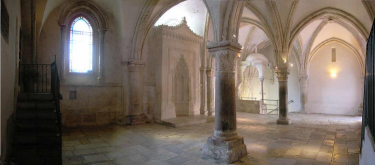
Synod rejects the error of those . . .
IV Who teach that in election to faith a prerequisite condition is that man should rightly use the light of nature, be upright, unassuming, humble, and disposed to eternal life, as though election depended to some extent on these factors.
For this smacks of Pelagius, and it clearly calls into question the words of the apostle: We lived at one time in the passions of our flesh, following the will of our flesh and thoughts, and we were by nature children of wrath, like everyone else. But God, who is rich in mercy, out of the great love with which he loved us, even when we were dead in transgressions, made us alive with Christ, by whose grace you have been saved. And God raised us up with him and seated us with him in heaven in Christ Jesus, in order that in the coming ages we might show the surpassing riches of his grace, according to his kindness toward us in Christ Jesus. For it is by grace you have been saved, through faith (and this not from yourselves; it is the gift of God) not by works, so that no one can boast (Eph. 2:3-9).
_________________________________________________
The fourth error to be rejected is very popular today. This is the idea that God elects those who, through natural ability and spiritual insight, place themselves in a position to receive grace from God. This, of course, is utterly Pelagian, and amounts to an outright denial of sola gratia (grace alone). It also denies the biblical teaching about election as set forth in articles one through nineteen of the Canons.
In the Pelagian scheme, grace is merely incidental to our salvation. Grace is understood as the communication of right information about what God requires of us, so that the creature can do (using their natural ability) what is necessary to be saved. This road is paved with human ability, and inevitably leads to the dead-end of works-righteousness.
Unfortunately, this very flawed idea is all-too common in American Evangelicalism. In large measure, it was bequeathed to us by one Charles Grandison Finney, who wrote in his Systematic Theology, “Regeneration consists in the sinner changing his ultimate choice, intention, preference; or in changing from selfishness to love and benevolence; or, in other words, in turning from the supreme choice of self-gratification, to the supreme love of God and the equal love of his neighbor. Of course the subject of regeneration must be an agent in the work” [Systematic Theology, p. 224].
This is simply amazing! If we jiggle the lever in the right way, and use the right means, we don’t even need the grace of God to be saved. According to Finney, even after the Fall, we still possess sufficient natural ability to do what God requires of us. We must be agents and subjects in this work.
The logical consequence of this is that our salvation does not at all depend upon God. Rather, it depends upon us. As the Princeton theologian B. B. Warfield once remarked in response to Finney, this is not theology at all, this is ethics. As Warfield put it, “we said that God might be eliminated entirely from Finney’s ethical theory without injury to it: are we not prepared to now say that [God] might be eliminated from it with some advantage to it.” Sad, but true.
The denial that our salvation begins in God with his gracious decree of election leads to a host of errors and skewed practices. Finney is the father of American Revivalism, characterized by the frontier tent-meeting and the sawdust trail. Finney’s revivalist legacy is most clearly seen today in the countless stadiums filled with people being urged to “let God” do this, that, or the other. Finney is also the father of the alter call and the “evangelistic meeting” which takes place apart from the normal preaching and sacramental ministry of the local church. It was the stress upon the “new measures,” as Finney called them, that largely served to displace the sacramental and preaching ministry of the church, for the technique-oriented evangelism of modern America.
In fact, it could be argued that the church growth movement--especially those forms which seek to entice so-called “seekers” to church by removing those things from the church service which offend them (in other words, anything distinctly Christian)--can be traced back to Finney’s new measures. Now, however, the "new measures" come to us couched in the language of marketing and sales, target groups and demographics. Whether it be Rick Warren, Joel Osteen, or even Billy Graham, there is no doubt that one branch of each of their respective intellectual family trees, traces back to Charles Finney. And even if other branches in that same family tree can be traced back to Protestant forebears, these historic Protestant traits are now most certainly recessive. No doubt, Finney’s theological family tree and familial characteristics now dominate much of the American church.
Again, we need to remind ourselves that the Bible (summarized by the Canons) does not approach this subject from the perspective that everyone is entitled to a chance at heaven, and already possesses the natural ability to get there, if only they will. The Scriptures do not begin with human freedom, as the Pelagian argues. The Scriptures begin with the fall of Adam into sin, and the consequences of that event upon the entirety of the human race. To put in Dwight Moody's terms, this means that we lost our vote and our freedom in the Fall! And because the entire human race fell with Adam, we are everything that the Scriptures say about us--dead in sin, unwilling and unable to come to Christ through the mere exercise of our will.
Therefore, we must begin this discusison where the Bible does–with the fact of human sinfulness, and with the idea clearly in our minds that no one deserves to go to heaven, and that not one of us can do anything to get there. To start with the presupposition that unless we have free will to choose God whenever we wish, or else Christianity (and by implication - God) would not be fair, we miss the point. God does not owe sinners anything. And if we are thinking this way, we have imbibed way too deeply from our democratic and egalatarian culture. We are not approaching things, as we should, from the perspective on human nature given us in the Holy Scriptures.
As we have said repeatedly throughout this series, the degree to which we argue that we contribute something to our salvation is the degree to which we deny sola gratia. It was Charles Spurgeon who said, “he that thinks lightly of sin, thinks lightly of the savior.”
It is really very simple. Either God saves sinners who are dead in sin through his sovereign election, calling them forth from the grave when they could contribute nothing, or else sinners have something good within them is that not somehow tainted, corrupted, polluted our damaged by the fall. As we have seen, the Scriptures teach the former rather than the latter. To add anything we do to grace alone, is to deny grace alone! You cannot have it either way.
As Calvin puts in the Institutes, “Whatever mixture men study to add from the power of free-will to the grace of God, is only a corruption of it; just as if anyone should dilute good wine with dirty or bitter water.” Since we are sinful from head to toe, from hair to toenail, whatever our contribution we might add to God’s grace, only can serve to pollute, not to activate the grace of God!
And so when we look to as answers for questions like, “Why does God save this one rather than that one?” we do well to do as Canons remind us, recall to mind the words of the apostle Paul recorded in Ephesians 2:1-10: 1 And you were dead in the trespasses and sins 2 in which you once walked, following the course of this world, following the prince of the power of the air, the spirit that is now at work in the sons of disobedience— 3 among whom we all once lived in the passions of our flesh, carrying out the desires of the body and the mind, and were by nature children of wrath, like the rest of mankind. 4 But God, being rich in mercy, because of the great love with which he loved us, 5 even when we were dead in our trespasses, made us alive together with Christ—by grace you have been saved— 6 and raised us up with him and seated us with him in the heavenly places in Christ Jesus, 7 so that in the coming ages he might show the immeasurable riches of his grace in kindness toward us in Christ Jesus. 8 For by grace you have been saved through faith. And this is not your own doing; it is the gift of God, 9 not a result of works, so that no one may boast. 10 For we are his workmanship, created in Christ Jesus for good works, which God prepared beforehand, that we should walk in them.
It really is that simple. God saves sinners. God does not tell sinners what to do so that they can save themselves.
 Monday, May 12, 2008 at 09:11AM
Monday, May 12, 2008 at 09:11AM  The audio from Ken Samples' most recent Academy lecture from his series, "A Little Lower Than the Angels: The Christian View of Man - Part VI," has been posted on the Christ Reformed website (www.christreformed.org).
The audio from Ken Samples' most recent Academy lecture from his series, "A Little Lower Than the Angels: The Christian View of Man - Part VI," has been posted on the Christ Reformed website (www.christreformed.org).









